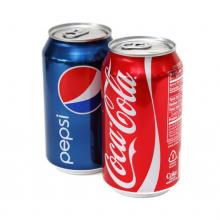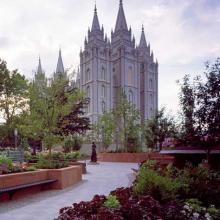mormons
Caffeine-craving students at Brigham Young University are pushing the Mormon-owned school to change its stance on cola drinks.
The move was triggered by Aug. 30 statements from BYU spokeswoman Carri Jenkins in which she said that the school doesn’t serve or sell caffeinated drinks because there has not “been a demand for it.”
The ban on caffeinated sodas is “not a university or church decision,” Jenkins told The Salt Lake Tribune then, one day after the Church of Jesus Christ of Latter-day Saints posted a statement on its website saying that “the church does not prohibit the use of caffeine," only "hot drinks" like tea and coffee.
BYU's dining services does conduct “online surveys, focus groups and data analysis” to determine what items to offer on campus, BYU’s The Universe student newspaper reported, but “has not asked about caffeinated soft drinks.”
“I have received emails on both sides of the issue — those in favor of caffeine and those against it,” Dean Wright, director of dining services, told the student paper. “Dining Services is so busy just getting everything open and serving over 30,000 meals a day that we do not have any plans at this point to do any polling on caffeine.”
SALT LAKE CITY — Maybe now, reporters, bloggers, outsiders, and even many Mormons will accept that the Utah-based Church of Jesus Christ of Latter-day Saints does not forbid drinking cola.
On Aug. 29, the LDS church posted a statement on its website saying that “the church does not prohibit the use of caffeine” and that the faith’s health-code reference to “hot drinks” “does not go beyond (tea and coffee).”
A day later, the website wording was slightly softened, saying only that “the church revelation spelling out health practices ... does not mention the use of caffeine.”
Most Mormons in Utah believe that Mitt Romney’s rise to become the likely GOP presidential nominee is a good thing for the Church of Jesus Christ of Latter-day Saints. But many do not trust the media to cover the church fairly, according to a new poll released on June 25.
The study, conducted by Key Research and Brigham Young University’s Center for the Study of Elections and Democracy, is believed to be the first to gauge Mormons’ reaction to Romney’s barrier-breaking achievement. He is the first Mormon to clinch the presidential nomination of a major U.S. political party.
More than eight in 10 Utah Mormons said they are “very excited” or “somewhat excited” about Romney’s feat. Nearly as many (77 percent) said his nomination is a good thing for the LDS church; just 2 percent told pollsters it was a negative development.
SALT LAKE CITY—If you suspected the newly released U.S. Religion Census overstated the Mormons' growth rate, you were right. That’s because, this time around, the Utah-based Church of Jesus Christ of Latter-day Saints changed the way it reported its membership to the researchers.
The once-a-decade study was assembled by the Association of Statisticians of American Religious Bodies, which included self-reported data on adherents for 153 participating bodies.
Its report pegged U.S. Mormon growth at 45.5 percent, jumping from 4.2 million in 2000 to 6.1 million in 2010. The 2000 figure, however, was much lower than the 5.2 million listed in the LDS church’s own almanac for that year. If researchers had been given that figure, the percentage of growth would have been considerably smaller, closer to 18 percent.
WASHINGTON — The founders of the Republican Party saw Mormons as their enemies. And the first Mormon leaders didn't have much nice to say about the GOP, either.
You would never know it now — one recent poll showed three-quarters of Mormon faithful lean toward the GOP — but the two groups had an acrimonious start, fueled largely by the early Mormon practice of polygamy.
As Mitt Romney presses his bid for the Republican nomination for president, many Americans don't realize how his Mormon faith played an important role as foil in the early days of the GOP — and how its first candidates catapulted to power in part by whipping up anti-Mormon sentiments.




